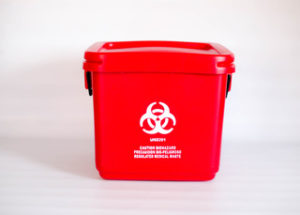Streamlined Solutions: Simplifying Medical Care Protocols with Expert Medical Waste Disposal
Streamlined Solutions: Simplifying Medical Care Protocols with Expert Medical Waste Disposal
Blog Article
Comprehending the Different Kinds of Garbage Disposal Strategies
In the world of waste administration, the selection of disposal techniques offered today is large and differed, each approach serving an unique purpose in resolving the challenge of waste disposal. click here. From recycling approaches that aim to provide brand-new life to materials, to the complex processes of contaminated materials administration, the landscape of waste disposal is complicated yet vital for ecological sustainability. Comprehending the subtleties of these various methods not only loses light on the importance of accountable waste administration but likewise triggers us to reassess our approach in the direction of waste disposal in a rapidly advancing globe

Recycling Methods
Recycling techniques are essential for lasting waste monitoring methods in both residential and industrial setups. medical waste removal near me. By executing reliable recycling methods, a significant quantity of waste can be drawn away from land fills, conserving all-natural resources and lowering the ecological influence of manufacturing processes
In suburbs, curbside recycling programs play an essential duty in encouraging households to separate recyclable materials from basic waste. Products such as paper, plastics, glass, and metals can be sorted and gathered for processing right into brand-new items, lowering the need for basic materials and energy-intensive manufacturing processes.
Industrial facilities additionally depend on reusing methods to minimize waste generation and promote a circular economic climate. By applying closed-loop systems, organizations can recycle materials within their production processes, decreasing costs and environmental impact. medical waste disposal. In addition, commercial recycling programs typically entail partnerships with specialized recycling centers to ensure that materials are properly sorted, processed, and rehabilitated right into the supply chain
Composting Techniques

Oxygenated static stack composting includes mixing organic waste materials in a large pile and consistently turning it to ensure proper aeration. This method is reliable for large composting procedures. On the other hand, vermicomposting utilizes earthworms to break down raw material right into nutrient-rich spreadings. This strategy is fit for smaller-scale operations and homes.
In-vessel composting includes putting natural waste in a closed container with regulated problems for temperature and aeration. Windrow composting includes developing long rows of organic waste and regularly transforming them to advertise decay - medical waste removal.
Landfill Disposal
Landfill disposal is a typically used method for handling waste that can not be reused or composted. It involves burying waste in designated areas of land, with appropriate safety measures to stop environmental contamination. Garbage dumps are crafted centers designed to separate waste from the surrounding setting. The waste is compacted and covered with soil day-to-day to reduce odors, prevent pests, and lessen the spread of clutter. Modern garbage dumps are geared up with protective liners and keeping track of systems to prevent leakage of harmful materials into the dirt and groundwater. Methane gas, a result of decaying organic waste in garbage dumps, is frequently collected and made use of as a resource of sustainable power. Regardless of innovations in landfill modern technology, worries continue to be concerning the long-term ecological effects, such as groundwater contamination and greenhouse gas discharges. Efforts to minimize dependence on land fills consist of promoting waste decrease, reusing, and exploring different waste disposal approaches to minimize the ecological impact connected with traditional garbage dump disposal techniques.

Waste-to-Energy Incineration
Incineration of waste for power generation is a technique progressively being thought about as an option to standard landfill disposal methods. Waste-to-energy incineration entails the combustion of waste materials at heats, generally in specialized facilities created to produce power or warm via the process - click here. This method not only decreases the volume of waste that would or else be destined for landfills but also harnesses the heat produced during incineration to develop power
Among the essential benefits of waste-to-energy incineration is its capability to create electricity while reducing the ecological impact contrasted to traditional land fill disposal approaches. By transforming waste right into power, this technique aids in lowering greenhouse gas discharges and reliance on nonrenewable fuel sources for energy generation. Additionally, waste-to-energy facilities are furnished with advanced air contamination control innovations to reduce prospective toxic wastes released throughout the combustion procedure.
Contaminated Materials Management
.jpg)
Taking into consideration the crucial value of responsible waste management methods, particularly in the realm of environmental sustainability, the emphasis currently changes towards the elaborate domain of Hazardous Waste Management. Contaminated materials presents substantial risks to both human health and wellness and the setting, requiring specialized handling and disposal Related Site strategies. Typical examples of contaminated materials include chemicals, batteries, pesticides, and digital waste.
Unsafe Waste Monitoring involves the identification, collection, transport, therapy, and disposal of products deemed dangerous or potentially hazardous. This process needs adherence to stringent regulations and guidelines to mitigate adverse influence on ecological communities and public wellness. Numerous techniques are utilized in taking care of contaminated materials, consisting of recycling, secure landfills, encapsulation, and chemical treatment.
Appropriate Contaminated Materials Administration is important for preventing contamination of soil, water resources, and air pollution. It is important for markets, research laboratories, health care facilities, and various other generators of contaminated materials to implement durable administration techniques, training programs, and emergency situation action plans to make certain the risk-free handling and disposal of these materials. Failing to take care of contaminated materials appropriately can have significant effects, highlighting the significance of thorough and accountable methods in this area.
Final Thought
Finally, waste disposal techniques play a critical role in handling and lessening the influence of waste on the atmosphere. From recycling and composting to landfill disposal and waste-to-energy incineration, each technique has its very own benefits and limitations. Correct administration of unsafe waste is additionally necessary to safeguard public health and the atmosphere. It is important for industries and individuals to understand the various waste disposal methods available and select one of the most suitable approach for lasting waste management.
In the world of waste management, the range of disposal methods available today is vast and varied, each approach offering an unique function in addressing the difficulty of waste disposal. click here. From recycling approaches that aim to offer new life to materials, to the detailed processes of hazardous waste monitoring, the landscape of waste disposal is complex yet essential for ecological sustainability. Comprehending the nuances of these various methods not just sheds light on the relevance of responsible waste management but also prompts us to reconsider our technique towards waste disposal in a rapidly developing world
Efforts to decrease dependence on garbage dumps include promoting waste reduction, reusing, and checking out alternate waste disposal techniques to reduce the ecological impact linked with standard garbage dump disposal methods.
It is crucial for people and industries to recognize the different waste disposal strategies offered and pick the most suitable technique for sustainable waste management.
Report this page